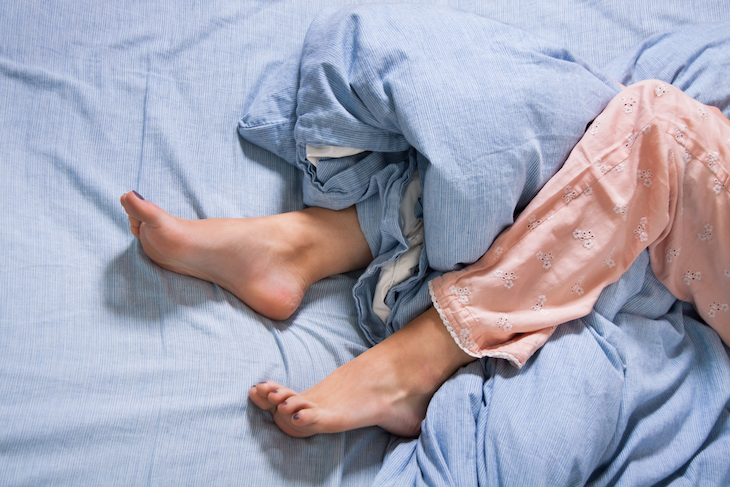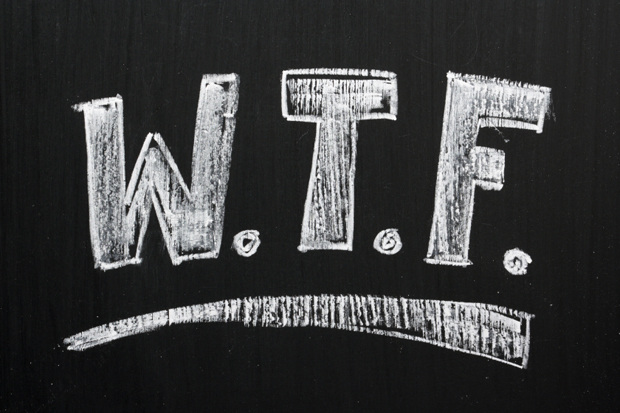I’ve read several books about sleep recently, and their authors all tell me the same three things. The first is that, in the modern world, it’s hard to get enough sleep. The second is that sleep is very important. Every night, we pass out. Every morning, we regain consciousness, half aware that time has passed. For a moment, we might have the impression we’ve just been flying through the air, or that we’re about to be executed. The whole thing is totally weird. That’s the third thing.
Before I get into the weirdness, I’ll say something about the importance of sleep. Authors tend to think that what they’re writing about is important. But sleep authors are a breed apart. They’re like sleep salesmen. And I’ve never come across a sleep salesman quite as dedicated as Matthew Walker. An Englishman, he is the director of the sleep and neuroimaging laboratory at the University of California, Berkeley. ‘I am in love with sleep,’ he tells us. ‘I am in love with everything sleep is and does.’
So: what is sleep? Well, it’s not ‘the absence of wakefulness’. It’s the presence of something, a different state — one that heals you, increases your lifespan, helps you to look slim and toned, makes you brighter and more charming, more attractive, sharper, better at maths and spelling, better at driving. I could go on for ages. Walker tells you, over and over, of the benefits of sleep. Reading late at night, I turned the pages, fascinated, hour after hour. I kept wanting to go to sleep. But not because the book is dull. It’s like reading about the joy of swimming, and wanting to jump into a lake.
It’s not just that sleep is good. It’s that not sleeping — or even not sleeping for the full eight hours — can be terrible. I knew that five or six hours wasn’t great. Walker tells us just how bad it can be. What’s the worst sickness you can think of? Well, not sleeping enough might give you that very sickness. Sleeping too little, for instance, ruins your immune system. Walker cites an experiment in which people had a virus sprayed up their noses; people who got a good night’s rest were much less likely to be laid low.
Not sleeping enough, Walker tells us, can lead to many conditions: ‘Alzheimer’s disease, anxiety, depression, bipolar disorder, suicide, stroke and chronic pain.’ Also: ‘cancer, diabetes, infertility…’ But he doesn’t just list these horrors. He explains, at length, how sleep wards them off. For instance, if you imagine your brain as a city, it has a sort of sewage network. When you use your brain to think, your brain cells emanate waste matter. When you sleep, your brain gets a ‘power cleanse’ — some of the cells shrink, allowing cerebrospinal fluid to flush out the debris. Some of this debris is the type of protein that causes Alzheimer’s disease. ‘Parenthetically, and unscientifically,’ says Walker, he can think of two famous sleep-dodgers. Ronald Reagan and Margaret Thatcher. Maybe their sewage systems backed up.
Every animal sleeps. Insects sleep. Dinosaurs slept. Dolphins sleep by switching off half their brains, and then the other half, but never both at once. Sleep, we keep thinking, is not about doing nothing. It’s like taking your car for a service. Every part of you is spruced up. And dreams are extremely important. Dreams enable you to make creative connections. Incidentally, you dream more as the night goes on. So if you only have six hours, your creativity will suffer.
When you dream, the connection is cut between your brain and your muscles, so you’re temporarily paralysed. This stops you from thrashing around. Meanwhile, your eyes roll around in their sockets. If you suffer from PTSD, your brain might be trying to process the bad memories; if it fails, it might try again the next night. Hence recurring nightmares, which might ruin your sleep. Walker tells us about his research into recurring nightmares;
it’s fascinating.
As is the whole of this book. Is there a better book about sleep? I doubt it. He tells us about hundreds of other things — ‘microsleeps’, falling asleep at the wheel, the way light and screens trick our body clocks, so we stay awake too long. And the less we sleep, the shorter our lives are. Yes, I thought, as I finished this book, sleep is hugely underrated. Then I looked at the clock. Could that really be the time?
Got something to add? Join the discussion and comment below.
Get 10 issues for just $10
Subscribe to The Spectator Australia today for the next 10 magazine issues, plus full online access, for just $10.
You might disagree with half of it, but you’ll enjoy reading all of it. Try your first month for free, then just $2 a week for the remainder of your first year.














Comments
Don't miss out
Join the conversation with other Spectator Australia readers. Subscribe to leave a comment.
SUBSCRIBEAlready a subscriber? Log in